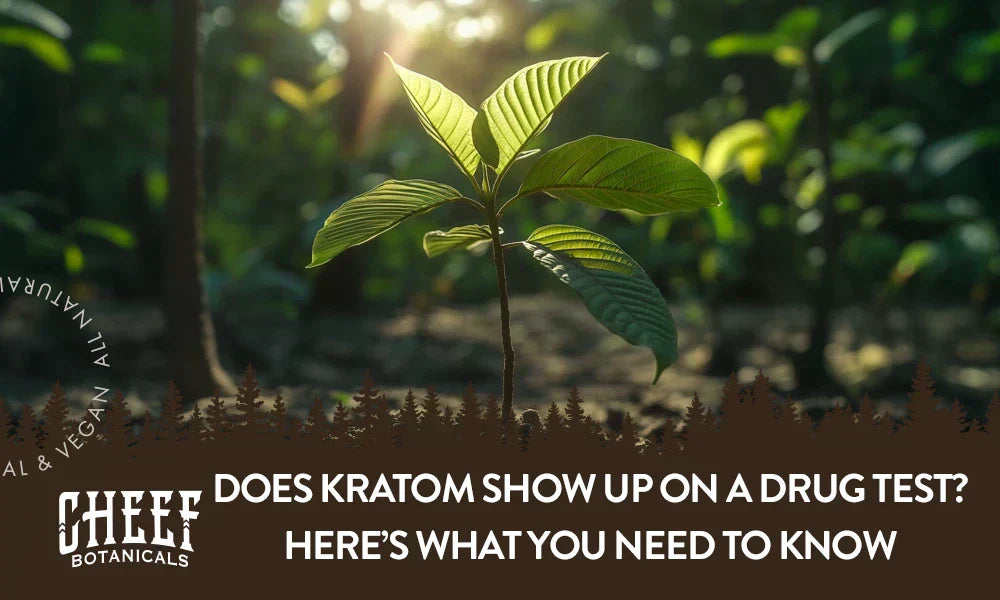Does kratom show up on a drug test? As it increases in demand, many people have begun to ask this question. While kratom isn’t part of most standard drug panels, certain specialized tests can detect its active compounds. Here’s the twist—whether or not kratom gets flagged often depends on the type of test, how often you’re consuming it, and your body’s metabolism.
Kratom acts on some of the same receptors as opioids, which might raise eyebrows. Curious how that all plays out? We’re breaking down everything you need to know.
What Is Kratom and Why Do People Use It?

Kratom is a tropical tree found in Southeast Asia, especially in countries like Thailand, Indonesia, and Malaysia. People have consumed kratom leaves for centuries because of their energetic and relaxing properties, depending on the amount taken.
Common Uses and Natural Origin
Kratom has been used for centuries in Southeast Asia, where people chew the leaves or brew them into tea. It’s known for supporting energy, focus, or natural relief after physical work. Smaller amounts may support alertness, while higher doses are more calming.
In the U.S., kratom is commonly sold in powder, capsule, or tea form. Many include it in their wellness routine for emotional balance or support with opioid withdrawal symptoms. While not a prescription drug, kratom use continues to grow among people seeking plant-based options.
Active Compounds: Mitragynine and 7-Hydroxymitragynine
Kratom leaves contain two main active compounds: mitragynine and 7-hydroxymitragynine. These kratom alkaloids interact with the body’s opioid receptors but do not belong to the opioid category. Mitragynine is more dominant and appears in larger amounts. It supports energy levels or promotes calmness, depending on how much you consume.
7-hydroxymitragynine is more potent and may have stronger effects. This compound is what many specialized drug tests try to detect. Both alkaloids are what give kratom its psychoactive effects, and why kratom detection depends heavily on the type of drug test performed.
Do Drug Tests Detect Kratom?
Most standard drug tests will not detect kratom. A basic 5-panel drug test is designed to find marijuana, cocaine, opiates, amphetamines, and PCP. Since these panels do not include kratom alkaloids, kratom use often goes unnoticed. However, a 10-panel drug test may detect kratom if the panel specifically includes its active compounds.
Standard Panels vs. Specialized Testing
Standard drug tests are built to catch common controlled substances linked to drug abuse or substance abuse. These tests usually skip kratom detection because kratom is not classified as a controlled substance at the federal level. Some testing labs offer specialized tests that can detect kratom alkaloids, but they are only used when requested.
Specialized tests are more sensitive and can identify kratom metabolites like mitragynine and 7-hydroxymitragynine. These tests are more likely to appear in court cases or advanced screenings where specific drugs or substances need to be identified.
Why Kratom Isn’t Usually Included
Kratom is not part of standard testing because it does not fall under the same regulations as other drugs. Even though kratom acts on opioid receptors, its compounds do not match those found in common opioids. This means kratom will not register unless the test is set up to detect it directly.
Because kratom is federally legal, most employers do not require screening for it unless there are legal implications or specific company rules. Only when a test includes targeted screening for kratom metabolites will the substance show up in results.
What Types of Drug Tests Can Detect Kratom?
Kratom doesn’t show up on most standard drug tests, but it can appear in results when labs use specialized tests. These tests are designed to detect kratom alkaloids like mitragynine and 7-hydroxymitragynine. The accuracy depends on the type of test and how recently you’ve used kratom.
Urine Tests
A urine test is the most common method for kratom detection. While a basic test won’t flag kratom, a 10-panel drug test or expanded screening can detect it if mitragynine is included. Kratom may stay in your urine for up to a week, especially with frequent use or higher doses.
Urine testing is popular because it’s easy to administer and cost-effective. Some labs offer specialized tests that detect kratom metabolites more accurately than standard drug tests.
Blood and Saliva Tests
Blood tests can detect kratom shortly after consumption, but the window is brief. Kratom may stay in the blood for only a few hours to a couple of days, depending on your metabolism and dosage. These tests are more invasive and are usually reserved for medical or legal evaluations.
Saliva tests are less reliable for kratom detection. Most panels do not target kratom alkaloids, and there's limited research on how well these tests work for kratom. However, some workplaces are starting to explore saliva-based screening options.
Hair Follicle Tests
Hair follicle testing can detect drug use over extended periods, often up to 90 days. While kratom detection through hair tests is rare, it is possible if the lab includes alkaloid screening. These tests are highly sensitive and often used in legal or forensic cases, but they are not routine for kratom.
How Long Does Kratom Stay in Your System?
Kratom doesn’t leave your body right away. How long it stays depends on your kratom dosage, how often you’re taking kratom, and how your body processes it. Most of the time, kratom detection is possible for several days after your last use.
Factors That Influence Duration (Age, Weight, Dosage)
Several factors affect how long kratom stays in a person’s system. Your body weight, age, and metabolism all play a role. People with faster metabolisms may process kratom alkaloids quickly. Those with slower metabolism or co-occurring health problems may hold onto the compounds longer.
Higher doses and frequent kratom use increase the detection window. Even hydration and activity levels can affect how quickly your body clears kratom metabolites.
General Detection Windows for Mitragynine
Mitragynine, the main compound in kratom, can remain in your system for different lengths of time depending on the test. A urine test may detect kratom for up to a week, especially in regular users. Blood tests usually show results within a few hours to two days. Hair follicle testing may reveal traces of kratom use for up to 90 days, although it’s less common. There is limited research on saliva, but it likely has the shortest window.
Can Kratom Cause a False Positive on a Drug Test?
Kratom won’t usually cause a false positive on a standard 5-panel drug test. But in rare cases, kratom alkaloids or additives in low-quality products may interfere with test results. This could trigger a false positive for other drugs, especially opioids like methadone.
What to Watch for With Cross-Reactivity
False positives are rare but still possible in certain testing conditions. If you're consuming kratom regularly or using low-quality products, here are a few things to watch out for:
- Unregulated products can contain unknown ingredients or other substances that affect test accuracy
- Kratom metabolites may react with older immunoassay-based tests
- There is limited research on how often kratom leads to cross-reactivity
- Those consuming higher doses may have more kratom in their system, which increases the chance of error
- Always read product labels and avoid brands with no third-party testing
How to Confirm with Lab-Specific Testing
If you’re concerned, request a confirmation test. Specialized tests can accurately detect kratom and rule out a false positive. Labs that screen for mitragynine or 7-hydroxymitragynine provide clearer answers. This extra step ensures your results reflect actual kratom use and not confusion with other drugs.
Legal Status of Kratom and Drug Testing Implications
Kratom is federally legal in the U.S., but state and local laws vary. Some states allow regulated use, while others have banned it completely. Because of this, kratom use could still have consequences depending on where you live or work.
Is Kratom Banned in Certain States or Jobs?
A few states, including Alabama, Indiana, Vermont, and Wisconsin, have banned kratom. Others, like Florida and California, allow local cities or counties to restrict their use. Even in legal states, certain jobs, especially federal, healthcare, or government roles, may still test for kratom alkaloids. Failing a drug test in a restricted area can carry legal consequences, especially for people under probation or working in regulated industries.
Employer Testing Policies and Compliance
Some employers include specialized tests that detect kratom, even though it's not listed as a controlled substance. Company policies often go beyond state law, especially if the job involves safety or public trust. You may be asked to disclose herbal products or supplements before testing. To avoid issues, check your employer's drug policy and know whether they screen for kratom metabolites.
Final Thoughts – Does Kratom Show Up on a Drug Test?

Most people won’t test positive for kratom on a standard drug test, but that doesn’t mean it’s always clear-cut. If your employer uses specialized tests or you’re in a state where kratom is restricted, you could face legal implications or job-related consequences. Since kratom detection depends on factors like dosage, metabolism, and the type of test, it’s important to stay informed.
If you're looking for legal, plant-based support for balance and well-being, Cheef Botanicals offers a range of CBD products made from hemp. These formulas are also crafted to help promote calm, focus, and daily wellness.






Leave a comment
This site is protected by hCaptcha and the hCaptcha Privacy Policy and Terms of Service apply.